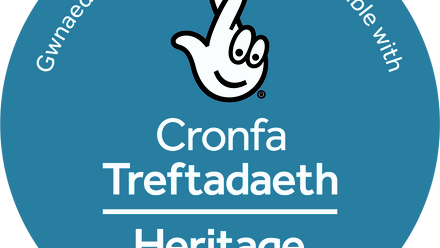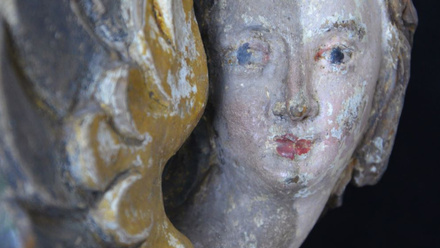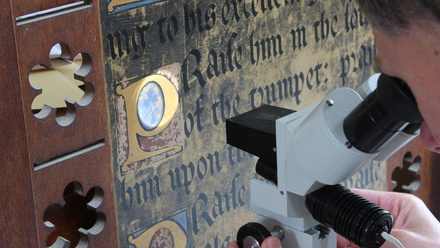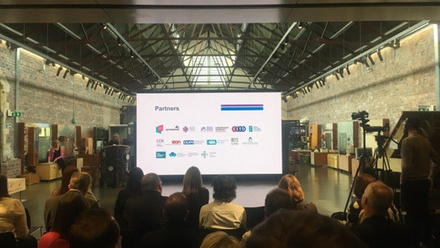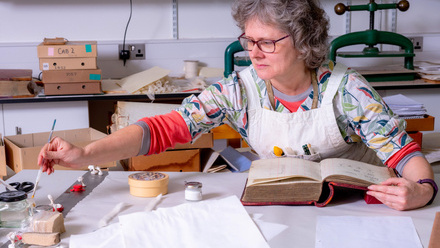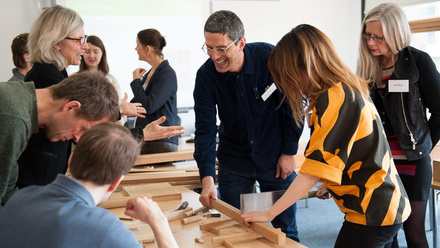Abigail Bainbridge ACR, Chair of Icon Book & Paper Group, shares the background to the popular Conservation Together at Home webinar series and reflects on its success.
Reimagining conservation
In Spring 2020, the Coronavirus pandemic and subsequent lockdown meant that many conservators found themselves all of a sudden required to stay at home, away from their usual places of work. The Icon Book & Paper Group Committee set out to support the newly isolated community of conservators and conservation students. We knew that, because conservation is a practical and hands on profession, working or learning at home would call for a total re-imagining of the ways many conservators normally approached their role.
As lockdown loomed, we wanted to provide a way to connect with each other, to facilitate professional development at a time when event after event was being cancelled. Our own AGM, normally a relatively large event with multiple speakers, had just been moved online. Fiona McLees ACR had the idea to start a series of live streamed talks, and we mobilised almost overnight to make it happen: luckily we’d already been holding committee meetings and some events online so we had the platform and the experience already in place.
We invited four people to start us off, with the premise that they would re-give conference papers that many people will have missed, offering participants an opportunity to catch up on recent scholarship without too much new work on the part of the speaker.
we wanted to provide a way to connect with each other, to facilitate professional development at a time when event after event was being cancelled
From digitisation to tarot cards
The first episode of our Conservation Together at Home series aired on Zoom on 26 March. Andrew Honey ACR FSA at Bodleian Libraries examined how 17th-century paper faults should be interpreted in his talk ‘Torn, wrinkled, stained, and otherwise naughty sheets.’ From then on, we were unstoppable, inundated with offers to speak.
While initially focusing on book and paper conservation, the popularity of the series encouraged us to start covering other specialisms too. The series expanded to include the Photographic Materials Group, Modern Materials Network, and Heritage Science Group and we soon had lectures on topics ranging from digitisation to tarot cards to biases in conservation four days of the week.
Considering the context of the pandemic, it didn’t feel right to charge for the lectures so we decided to offer them up for free as a good will gesture to the community. We went even further by opening up the events to non-members as we recognised the outreach potential to encourage participation from non-conservators. After all, one of Icon’s core values is to be inclusive and to ensure that opportunities to care for and engage with heritage are open to all - and of course, Icon membership is for everyone!
We realised that the time wouldn’t suit everyone, and didn’t want to restrict hearing the lectures only to those time zones convenient to the UK, so most of the lectures were recorded and posted on the Icon webpage. Our library of recordings now has over 30 videos for anyone to enjoy and learn from, a lasting legacy from the series.
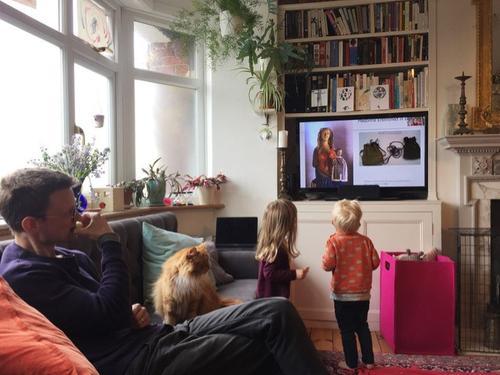
Abigail Bainbridge.
Global reach
By the end of Spring, we had reached some 9,000 viewers through the Book and Paper Group lectures alone. A total of 3.4k attended the live talks and a further 5.6k people watched the videos afterwards. Participants have come from all over the world, and many viewers have not had conservation backgrounds. By actively engaging with a non-specialist audience, the webinar series is helping to cultivate appreciation for and understanding of conservation; in its global reach, we have connected conservators who may not otherwise encounter each other.
in its global reach, we have connected conservators who may not otherwise encounter each other
We had emails from people offering their thanks for something to look forward to each week, something to pull them out of the daily challenge of lockdown. We had people in remote areas say they appreciated a solution to usually London-centric events, and people with mobility or other physical limitations or small children give thanks for an event that didn’t require travel. The photos that everyone sent in of their lecture series experience—laptops posed on kitchen tables, beds, piles of books, with biscuits, with tea—really did contribute to a feeling of togetherness even with no direct connection.
Lockdown inspired us to make use of the opportunities presented by a more digitally connected world but we’ll continue to encourage people from across the globe to value and learn about conservation even as we return to normality. Our experience demonstrated just how adaptable and dedicated conservators are. The volume of skilled speakers volunteering their time to teach, delight and inspire audiences speaks to the commitment of the profession. Even as the long ingrained way of how we approach our work was thrown into question, we found new ways to share knowledge, learn together and support each other.
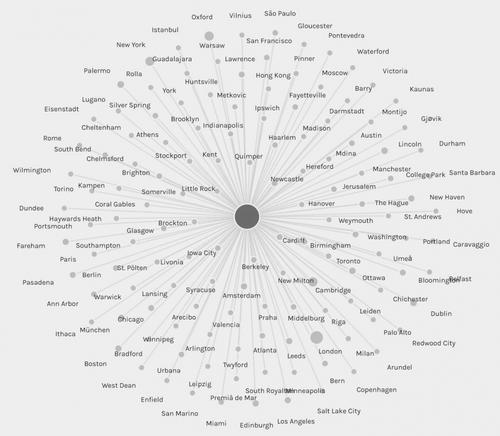
Find the recorded Conservation Together at Home talks on YouTube.
Tap into the energy of the conservation sector - become an Icon member!
---
Cover image showing locations of participants. Kiri Douglas.

